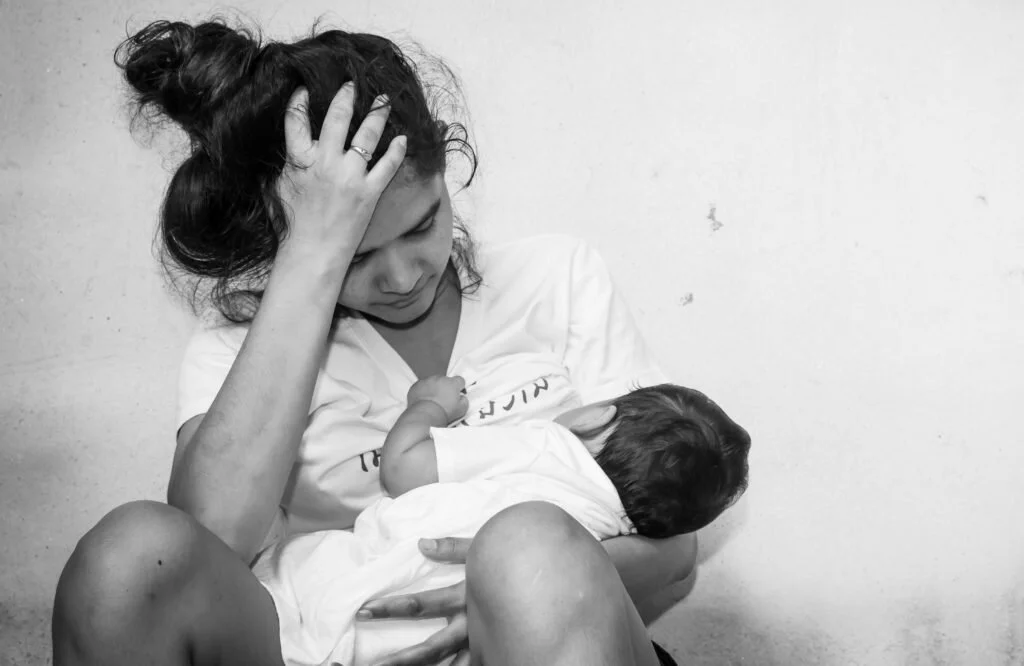Words that were once only a whisper in the past are now getting serious attention and for good reason. Baby blues & postpartum depression. It’s more common then you think yet it’s still considered one of those “taboo” phrases. Why? Generally after a women has a baby, family, friends, and even complete strangers expect them to be “naturally be elated.” The truth is, this isn’t always the case. While some women do feel that sense of joy and total connection to the baby(s) that have been growing in their womb for the last 42 weeks…there are some that don’t. Lets talk about those women. I don’t mean talk about them in that junior high whispering under your breath while deviously glaring like somethings wrong with them way. I mean lets TALK ABOUT THEM…openly…respectfully…and with some mercy and grace on the side.
Lets first talk about the stereotypes that surround women and birth. They are both astounding and ridiculous. To understand why baby blues and postpartum depression has become increasingly more common we have to look at some factors that play into it. The United States cesarean rate is 33%. The World Health Organization says cesarean rates should be between 10-15%. So why in a country that is the free leader of the developed world ranked as one of the highest in both caesarean and maternal/infant mortality rates? (for a black women the risk is even higher) “A new study has revealed first-time mothers who gave birth via unplanned c-section are 15% more likely to experience postnatal depression.” We also live in a culture where women are expected to work while pregnant, have a baby, and then return back to work less then two months later. It’s INSANITY. Let’s not forget that stay at home mom with multiple kids and a newborn infant. There are other factors that play into it as well, but these are some pretty heavy ones.
Did you know there are two main hormones during pregnancy that are affected? Estrogen and progesterone. After the baby is delivered, but more importantly after your placenta is delivered, your body triggers a sudden and severe drop in both of these levels. Such drastic drops in hormones is why you see new mothers “crying for no reason,” “ having out of nowhere outbursts,” or even “non responsiveness to their baby and surroundings.” There is a unrealistic expectation placed on women to immediately transition into this new and demanding roll of motherhood while being a career women, housewife, or mother of multiples. Very little attention or support is given to her need to heal physically and sometimes emotionally. Birth is traumatic on the body. Whether you have a natural birth or medicated birth, a vaginal birth or belly birth. Your body has expanded over the course of ten months, your organs have shifted in order to make room for another human being, and then you went through the process of labor to get them here. So this ridiculous thought that you shouldn’t be overwhelmed, or that it shouldn’t last for more then a month or two is ridiculous. Postpartum depression can last for months or even longer.
Did you also know that postpartum depression isn’t just something women go through? That’s right, even men can struggle with postpartum depression. Being thrust into the role of fatherhood while providing for your family is overwhelming as well. You have a crying newborn that only seems to want mom. Maybe you are sleep deprived because you are getting up in the middle of the night to help with feedings. Your wife may be distant, sex is no longer a option to release stress and tension. All of these things can trigger baby blues and depression in men as well.
There is no manual on how to raise a baby and how to juggle all the different hats you have to wear. Some women have said it was love at first sight, where others said that they felt disconnected, and even resentful at how demanding their baby could be. Some men have said they love their baby but miss having freedom, sleep, and intimacy with their partner. If you have had or are having these thoughts, please be encouraged that you are not alone, you are not a bad parent, and there is help. Its important to have a support group as you navigate these new waters. If you do not have close family or friends you can reach out to, I encourage you to contact a postpartum doula in you area. We can help with nursing if you are struggling, help you bond with your baby, have time for yourself, meal prep, and provide a ton of resources to get you the help you need from trained professionals. Most importantly release yourself from the expectations of others.
Xoxo,
Ashley
references:
https://www.who.int/reproductivehealth/publications/maternal_perinatal_health/cs-statement/en/
https://www.sciencedaily.com/releases/2019/01/190123105845.htm

